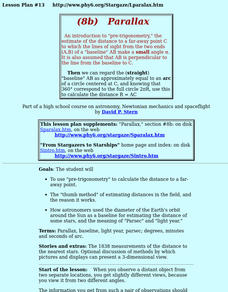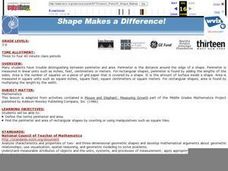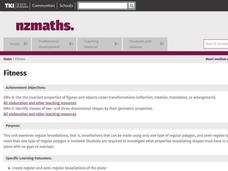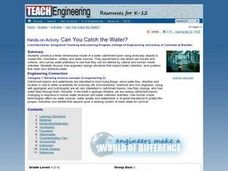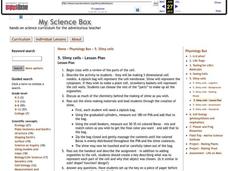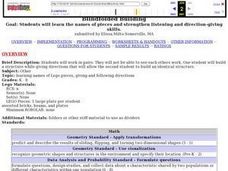Curated OER
Discovering Art - Scott Gallery: Line
Students study how line is used in art. They identify horizontal, vertical, and diagonal lines in artwork. They view the painting, The Western Brothers, and identify the line the dog makes and the position of the boy's arm. They discuss...
Curated OER
Present Hunt
In this game students move around a game board by spinning a spinner and moving to the next place on the board whose shape matches the one they spun.
Curated OER
Mobile-ize
Second graders, using a minimum of four space figures, create a mobile. They use a "Draw" program to first plan out their figure.
Curated OER
Introduction to Plates, Axles, and Gears
Pupils are introduced to the function and design of the following Lego pieces: beams, bricks, plates, axles, tires, hubs and bushings. They then work with a partner to build something using only these pieces.
Curated OER
Parallax
Pupils discover how astronomers used the diameter of the Earth's orbit around the Sun as a baseline for estimating the distance of some stars, and the meaning of "Parsec" and "light year."
Curated OER
Matter
Students complete a unit of activities to learn about states of matter and how to measure matter. In this matter lesson plan, students complete 8 lessons to learn about matter, its states, and how to measure matter.
Curated OER
Shape Makes a Difference!
Learners learn the difference between perimeter and area by watching a video and a hands on activity.
Curated OER
Fitness
Fourth graders determine how to design regular and semi-regular tessellations of the plane. They develop the ability to demonstrate why a tessellation covers the plane in this series of lessons.
Curated OER
Relationships and Functions
Fifth graders describe patterns as relations and functions. In this patterning lesson, 5th graders analyze and continue patterns. Students understand how patterns relate to relations and functions.
Curated OER
Drawing On Gray Toned Paper
Students create an artwork that uses organizational principles and functions to solve a visual arts problem. The piece creates the illusion of transparency used to unify a work of art that demonstrates that light advances and darks recede.
Curated OER
Can You Catch the Water?
Young scholars work together to construct a model of a water catchment basin. They survey water patterns and complete experiments to see where rain travels and collects. They discover how engineers design structures that help with...
Curated OER
Slimy cells
Learners study the parts of a cell. In this chemistry lesson students complete an activity in which they make as much slime as they want.
Curated OER
Measurement, Perimeter and Area
Students explore the concept of measurement. In this measurement instructional activity, students collect data about themselves such as height, finger length, neck circumference, foot length, and other body measurements. ...
Curated OER
Rotating Rings of Ice
Students work together to develop a model of Saturn and its rings. They identify what types of materials make up the rings and how they revolve around Saturn. They write a short paragraph describing the rings.
Curated OER
Compare 2-D Shapes
Second graders explore and analyze plane shapes. For this plane shapes lesson, 2nd graders evaluate shape attributes to classify shapes correctly. Students work in groups to create different shapes.
Curated OER
Geo Jammin' By DeSign - Day 1, Lesson 1: Math in Motion
Second graders, through large screen monitor, study geometric design. They participate in a diagnostic assessment in which they use pnecils, scissors and paste.
Curated OER
How Large is a Mole of M&M's
Students calculate whether or not a mole of M&M's fill their high school. They practice factor-labeling, define a mole, and calculate the number of cubic feet per mole of M&M's. To answer the question they measure and calculate...
Curated OER
Blindfolded Building
Pupils build a Lego design and then work with a partner to reproduce that design. They guide the building of the reproduction by description only and then check their work.
Curated OER
Chinese Art: Botanical Motifs
Pupils are introduced to Chinese Art and how artists used botanical motifs. They look at slides of motifs and then create a watercolor themselves. A functional motif will be created by them and they have to provide its meanings to the...
Curated OER
Clockwise
Second graders investigate angles through this series of lessons. They determine how angles turn in both clockwise and anticlockwise directions. They examine the characteristics of quarter half turns and how they can begin from any...
Curated OER
Triangle Attributes and Measures
Seventh graders explore the concept of triangles. In this triangles instructional activity, 7th graders sort triangles according to various attributes such as acute, obtuse, isosceles, or equilateral. Students find the area and perimeter...
Curated OER
Our Geometric World
Third graders explore the attributes of polygons. In this geometric shapes lesson plan, 3rd graders review quadrilaterals, squares, rectangles, triangles, pentagons, hexagons, and octagons in order to create hanging polygons. Students...
Curated OER
Conic Sections and Locii
Students differentiate between ellipse and hyperbola. In this algebra lesson, students graph and solve elliptical equations. They use the cabri program to create the different conics and move them around.
Curated OER
Pythagorean Theorem: Triangles and Their Sides
Students investigate triangles and their relationship to each other. In this geometry lesson, students solve right triangles using the properties of the Pythagorean Theorem. They differentiate between right, acute, straight and oblique...




